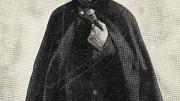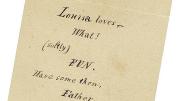Bronson Alcott is known today—if he is known at all—as the father of Louisa May, the author of Little Women and more than a dozen other books written mainly for girls. But for a large part of the nineteenth century, he was the more famous of the pair. Born into a poor farming family in 1799, he rose to become a Transcendentalist philosopher, a groundbreaking educational theorist, and an influential friend of a number of eminent New Englanders, including Emerson, Thoreau, and Hawthorne. He was also a grandiose dreamer and schemer whose unbending pursuit of his (at times bizarre) ideals led him to squander his meager savings, refuse most work, and nearly abandon his long-suffering wife, Abba.
Fans of Little Women and its sequels will remember that the four spirited March sisters were romantically impoverished: Amy struggled to scrounge up the spare coins for a treat of pickled limes, and Meg and Jo had to make do with old dresses and lemonade-stained gloves when they attended balls in the fancier parts of Concord. The four Alcott girls were not so lucky. Their father was fired from a series of teaching jobs because of his rigid insistence that children should not learn by rote, and the Alcott family was often indigent, forced to rely on charity from Bronson’s famous friends to help them through.
But even as Louisa and her sisters chafed under the poverty and restrictions of their childhood—Bronson’s philosophies forbade consumption of “animal material,” an epithet that came to encompass even honey and cotton—they were roaming free through the Massachusetts woods, putting on elaborate plays, and scribbling in the journals that their parents encouraged them to keep. John Matteson, J.D. ’86, who won a Pulitzer Prize earlier this year for Eden’s Outcasts, his double biography of Alcott père and fille, describes the contrast this way: “A typical day for Louisa began with a trip to Emerson’s house and might continue with a nature walk with Thoreau, only to end with a homeward trudge to a cottage where there was sometimes insufficient food, where the father wore the mantle of a social outcast, and where the mother tried to bear up under the weight of the ever-mounting debts and disappointments. Louisa’s life was in one sense lavishly wealthy. In another, it was perilously poor.”
Matteson found himself in a similar but opposite situation 20 years ago. He was thriving as a corporate lawyer in North Carolina, but longed to spend his days studying and writing about American literature, which was becoming increasingly important to him. At Harvard, he had quickly discovered that there were more enticing aspects to being in Cambridge than getting a legal education. During his three years at the law school, he learned to cook, spent hours chatting and arguing with his peers, and, most significantly, took elective English classes in his free time. Studying Melville, Dickens, and Twain with professors who included Sacvan Bercovitch and Robert Kiely turned out to be a good deal more stimulating than attending lectures on copyright law.
Matteson eventually quit practicing law and moved to New York to attend graduate school at Columbia University, where he wrote his doctoral thesis on ethics in the “Age of Emerson.” After publishing his first scholarly article, in the fall of 2001, he received an unexpected call from a literary agent eager to develop a book proposal with him. Matteson initially wanted to tackle the topic of nineteenth-century utopian communities, but quickly became obsessed with one in particular: Fruitlands, the radical commune that was founded by Bronson Alcott in 1843. (It failed that same year, largely due to Bronson’s haphazard farming skills; Louisa immortalized the absurdities of the operation later in a vignette, titled “Transcendental Wild Oats.”) Eventually, Matteson’s book evolved into a comprehensive examination of Bronson and his fraught but loving relationship with his headstrong and talented second daughter.
Matteson was drawn to the story of the Alcotts in part because he felt a kinship with Bronson. Here was another man who had made a midlife career change because he refused to choose safety over passionate scholarship, who cared more for the life of the mind than for the lure of creature comforts, and who had a deep interest in pedagogy. (Matteson is now a professor of English at John Jay College of Criminal Justice). And like Bronson, Matteson is the father of a daughter who possesses what he calls “a consuming desire to write”—a 14-year old who is hard at work on her own first book, a trilogy of fantasies based on the animals that appear in the first canto of Dante’s Inferno. “A light bulb went on,” Matteson says, “and I decided to use my experiences with my own daughter as a way of reading between the lines. This biography became a melding of life and art, of heart and head.”
To get a deeper look, he went back to Harvard. Houghton Library has a large and lush collection of Alcottiana: everything from locks of Bronson’s hair to correspondence between Louisa and Alf Whitman (the model for Laurie in Little Women). Bronson Alcott did not have his daughter’s gift for writing—most of his mystico-philosophical publications were brutally mocked by the critics of his day—but he shared with her an obsessive desire to set his life down on paper in any way he could. He was a fanatical diarist, chronicling the minutest milestones in his daughters’ development and just about every thought that ever crossed his mind.
In many ways, Matteson’s training in legal scholarship made him the ideal person to glean this bounty, which he describes as both “utterly marvelous and utterly frustrating.” Eden’s Outcasts brims with highly specific insights (at one point Matteson notes Louisa’s use of the word “nook” to describe a play space and contrasts it with Bronson’s earlier philosophical decree that “there should be no ‘nooks’ or secret places in the youthful mind”). It also sets out a compelling, almost lawyerly case for Bronson’s relevance and importance despite his many failures. His fiery insistence on living out his philosophy produced some spectacular embarrassments, but his experiments also bore spectacular fruit—including his own wild, introspective scribbler of a daughter. Matteson feels that the same is true of his own unconventional career. “Leaving a secure place in the law to go back to graduate school was thoroughly reckless and irrational,” he says, “but I had to do it, and it saved my life. It taught me the supreme value of choosing what is authentic rather than what is safe.”









